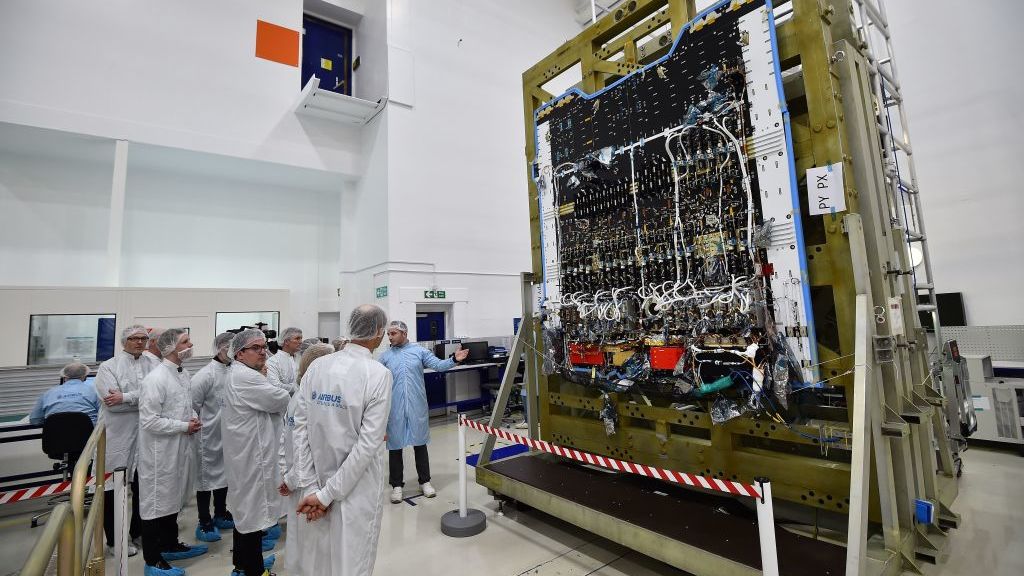New government fund launched to encourage business investment in satellite tech
£15 million will be made available to firms through a competition, as research suggests investment could yield a 1,080% ROI


The government has announced a £15 million competition to support UK businesses looking to enter the satellite communications market.
Companies that are developing technologies throughout the satellite sector will be eligible for the fund, submissions for which run until Spring. This includes those seeking to create satellite constellations of their own, to firms with designs for ground systems and software services to support low-earth orbit (LEO) networks.
RELATED RESOURCE

Setting your sights on data intelligence
A navigation guide to improving data-driven decision-making in the cloud
The fund will be provided through the UK Space Agency’s role in the European Space Agency’s (ESA) Advanced Research in Telecommunications Services (ARTES) programme.
Although the UK is no longer an EU member state, it is still a member of the ESA, and contributes approximately €420-450 million annually. For the period running January 2020 to December 2024, the UK has committed €2.1 billion, and 19% of this is to be spent in the form of contracts to 255 UK businesses.
The government claims that for every £1 million invested in the ESA across this period, the UK can expect a return of £11.8 million “over time,” a 1,080% return on investment, according to In its executive summary. It also estimates that each £1 million of investment delivers 9.8 person years of employment, with 47,000 people currently working in the UK space sector.
It is hoped that increased innovation across the sector will lead to a range of improvements in the UK and worldwide, such as progress towards net zero by supporting solutions such as Google Earth Engine, as well as through research and development of new hardware to reduce carbon emissions. Additionally, satellite communications networks carry security benefits, which could make them less susceptible to attacks on critical national infrastructure (CNI) and keep networks running in the case of natural disaster.
The ESA’s Telecommunications and Integrated Applications (TIA) directorate is working to extend the reach of 5G, consolidating the role that satellites can play to fulfil demand for communications networks, and providing consistent connections for use cases such as internet of things (IoT) devices.
Sign up today and you will receive a free copy of our Future Focus 2025 report - the leading guidance on AI, cybersecurity and other IT challenges as per 700+ senior executives
“There are a series of important programmes on the table and I want to harness opportunities in space to grow the UK economy, create jobs and inspire young people into STEM careers,” stated science minister Nusrat Ghani.
"We’re also making new funding available now to strengthen the UK’s position as a world leader in the satellite communications market, and I look forward to seeing the results of the competition.”
Through the ARTES programme, the ESA launch geostationary satellites developed by UK-based firm Airbus into orbit, where they will operate internet and communications services. The UK Space Agency has claimed it could see a 2,000% return on investment through the programme.
Satellite connectivity is a rapidly-expanding market, with competition amongst firms already increasing. With companies such as SpaceX and OneWeb currently leading the pack, there is also growing interest from governmental bodies such as DARPA in the potential for communications networks facilitated by LEO satellites. Satellite broadband could also turbocharge rural business connectivity, providing fast and stable internet to communities currently underserved by the rollout of 5G and fibre.

Rory Bathgate is Features and Multimedia Editor at ITPro, overseeing all in-depth content and case studies. He can also be found co-hosting the ITPro Podcast with Jane McCallion, swapping a keyboard for a microphone to discuss the latest learnings with thought leaders from across the tech sector.
In his free time, Rory enjoys photography, video editing, and good science fiction. After graduating from the University of Kent with a BA in English and American Literature, Rory undertook an MA in Eighteenth-Century Studies at King’s College London. He joined ITPro in 2022 as a graduate, following four years in student journalism. You can contact Rory at rory.bathgate@futurenet.com or on LinkedIn.
-
 UK firms are pouring money into AI, but they won’t see a return on investment unless they address these key issues
UK firms are pouring money into AI, but they won’t see a return on investment unless they address these key issuesNews An SAP report projects increased AI investment, but cautions that too many organizations are taking a fragmented approach
-
 Intel makes high-level hires while factory workers are warned of layoffs
Intel makes high-level hires while factory workers are warned of layoffsNews The company is appointing four senior executives as part of efforts to refocus on engineering and customer relationships
-
 UiPath names Simon Pettit as new AVP for UK and Ireland
UiPath names Simon Pettit as new AVP for UK and IrelandNews The seasoned leader will spearhead region-specific transformation projects as UiPath looks to drive operational growth and customer engagement
-
 How to empower employees to accelerate emissions reduction
How to empower employees to accelerate emissions reductionin depth With ICT accounting for as much as 3% of global carbon emissions, the same as aviation, the industry needs to increase emissions reduction
-
 Worldwide IT spending to grow 4.3% in 2023, with no significant AI impact
Worldwide IT spending to grow 4.3% in 2023, with no significant AI impactNews Spending patterns have changed as companies take an inward focus
-
 Report: Female tech workers disproportionately affected by industry layoffs
Report: Female tech workers disproportionately affected by industry layoffsNews Layoffs continue to strike companies throughout the tech industry, with data showing females in both the UK and US are bearing the brunt of them more so than males
-
 How can small businesses cope with inflation?
How can small businesses cope with inflation?Tutorial With high inflation increasing the cost of doing business, how can small businesses weather the storm?
-
 How to deal with inflation while undergoing digital transformation
How to deal with inflation while undergoing digital transformationIn-depth How can organizations stave off inflation while attempting to grow by digitally transforming their businesses?

